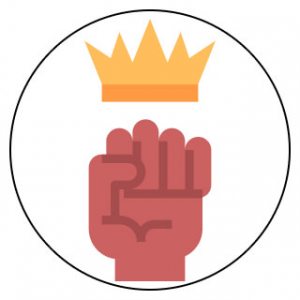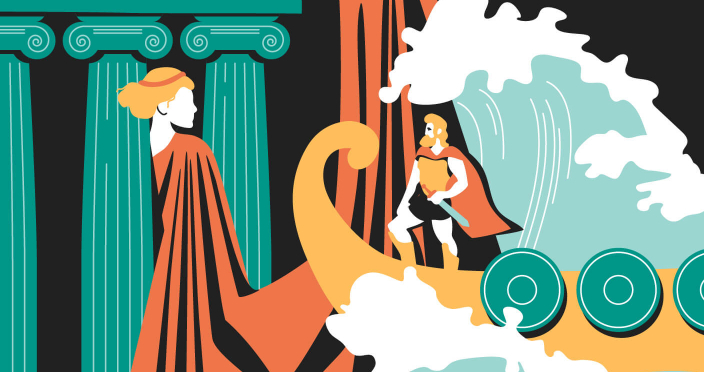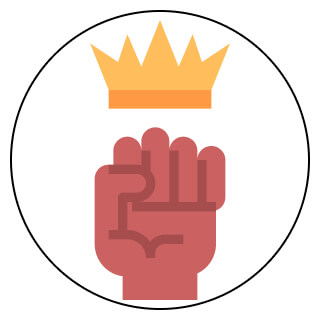Among the major themes in The Odyssey, perseverance stands out as the reason why Odysseus is able to overcome immense trials to return home. Quotes like, “Endure, my heart,” reflect this theme’s centrality. Other The Odyssey themes include the complexities of human relationships, loyalty, and hospitality. The latter theme, for instance, is highlighted through quotes about hospitality, such as the courteous welcome of the Phaeacians or the lack of it in the Cyclops’ lair.
This article delves into the themes of The Odyssey with a detailed book summary and examples of what topics are found in key moments of the story. We will explore the ideas of perseverance, loyalty, and justice, along with other topics that contribute to The Odyssey’s enduring relevance.
🥳 Hospitality

Everything in The Odyssey is reflective of the time it was written in. The main theme, which we see affect everything throughout the story, is tied with Ancient Greek myths and customs. Xenia, a Greek word for hospitality, is a fundamentally vital concept. It holds the whole poem together. It is an unspoken law that governs the land, and only absolute monsters would think to break it. Through his depictions of xenia in The Odyssey, Homer teaches his audience an important lesson in morality.
‘Guest-friendship’ is the most common translation of the word xenia. The Odyssey’s characters often visit new lands and encounter strangers. Even so, they almost always are met with a feast and leave with plenty of gifts. This is because any respectable host was expected to provide food and shelter to their guest. Meanwhile, any respectable guest was expected to accept these gifts. These rules of hospitality ensured that when the host would travel, they would be met with the same welcome.
Hospitality in Ithaca
There are plenty of examples of hospitality in The Odyssey. Early on, Telemachus is both an exceptional host and guest. He is the only one to give the deserved respect to Athena, disguised as Mentes, when she visits him in Book I. Telemachus provides the stranger with dinner before asking for a name. This is the customary practice in Greek hospitality – a bath and dinner first, questions later.
When Telemachus visits the kings Nestor and Menelaus, his behavior is exemplary of a good guest. He patiently waits for gifts from his hosts, even when he is in a rush to get home. He begs Menelaus to hurry, fearing for his and his father’s lives, but still stays for lunch.
We only ever see Telemachus break the rules of xenia once. He begs Pisistratus not to stop at his father’s palace, knowing how overbearingly generous the man is. He worries that because of all the requirements of hospitality, he will be held back even more. Nestor’s son agrees but warns Telemachus that his father will be extremely angry with this decision. This episode reminds us that while xenia is an all-important custom, it can also be extremely inconvenient and even harmful.
This point is also reiterated throughout Homer’s Odyssey through the suitors. As the primary antagonists, these young aristocratic men are the very nightmare of any Greek host. Greedy and gluttonous, they occupy the royal palace, eat until they are sick, and take advantage of Penelope and Telemachus. However, with Odysseus missing, the queen and young prince are unable to evict their guests. The laws of social convention prohibit them from displaying such crude behavior. This conflict shows the audience how hospitality in The Odyssey is a double-edged sword.
Hospitality on Odysseus’ Journey
With such strict rules in place, it is no wonder that friend and enemy alike help Odysseus out on his journey:
- The nymph Calypso breaks the code of hospitality by keeping the hero for seven years against his will. However, upon being instructed to let him go by the gods, she gives Odysseus a raft and supplies.
- The Phaecians welcome him with open arms. The young princess Nausicaa offers him help despite seeing a strange and scary man on her land. As Odysseus recalls the tale of his fate, we see several more examples of the importance of xenia.
- The sorceress Circe turns his men into pigs using trickery. However, upon being overpowered by the king, she turns into a gracious hostess. When Odysseus and his crew want to leave, Circe offers advice for the hero’s journey. Using her hospitable disposition, Homer aims to tell us that the sorceress is not all foul.
That’s why the most terrible villains of the story disregard the rules of xenia completely. At one point, Odysseus and his men find themselves on an island filled with one-eyed giants. However, it is not their appearance that makes them monsters. When Odysseus walks into the cave of the Cyclops Polyphemus, he attempts conversation. The creature immediately breaks the customs, demanding to know the identity of the people in his home. He then proceeds to laugh at Odysseus when he reminds him of the rules of hospitality and eats several of his men. If the suitors are the epitome of bad guests, then Polyphemus must be the worst host possible.
The behavior of characters regarding xenia is telling of their moral alignment. This theme of The Odyssey is not only a running motif – it separates good from evil. The monsters show no interest in being hospitable guests or hosts. Meanwhile, everyone from kings to ordinary people shows kindness and helps out the strangers arriving at their door.
Perhaps the most telling example of this is the swineherd Eumaeus. Odysseus arrives at his door disguised as a beggar. The king did not look like he could give anything in return, yet Eumaeus still treats him with kindness and respect. Despite not having much, he provides Odysseus with food, water, and shelter. He is put in stark contrast to the suitors. They insult the beggar, despite being members of the aristocracy. Eumaeus protects him from their abuse.
This is why the ending of The Odyssey must have been so satisfying for the Ancient audience. As we saw, the rude disposition of the suitors is condemned throughout the entirety of the story. Their behavior is disrespectful not only to the royal family but to the gods themselves. In Greek mythology, Zeus is the patron god of xenia. Thus, the slaughter of the suitors is seen as divine justice and fair punishment. The price for their transgression is justified death.
💬 Quotes about Hospitality
Daydreaming so as he sat among the suitors,
The Odyssey, Narrator, Book I
he glimpsed Athena now
and straight to the porch he went, mortified
that a guest might still be standing at the doors.
Just think of all the hospitality we enjoyed
The Odyssey, Menelaus, Book IV
at the hands of other men before we made it home,
and god save us from such hard treks in years to come.
Quick, unhitch their team. And bring them in,
strangers, guests, to share our flowing feast.
But since we’ve chanced on you, we’re at your knees
The Odyssey, Odysseus, Book IX
in hopes of a warm welcome, even a guest-gift,
the sort that hosts give strangers. That’s the custom.
Respect the gods, my friend. We’re suppliants—at your mercy!
Zeus of the Strangers guards all guests and suppliants:
strangers are sacred—Zeus will avenge their rights!
🐶 Loyalty

One of the most prevalent themes of The Odyssey is that of loyalty. The power of devotion to family, friends, and gods is emphasized throughout the epic. It is one of the main driving factors behind Odysseus’ persistence to return home. Homer makes his point clear: fidelity is praised and rewarded, while treachery is punished.
Family
We cannot talk about loyalty in The Odyssey without immediately bringing up Odysseus’ wife, Penelope. After all, she waits for her husband’s return for twenty long years, never losing hope. She refuses to marry one of the suitors despite their insistence. She even devises a cunning plan to trick them. By weaving and then unraveling the burial shroud for Laertes, the queen gives Odysseus the time needed to get home.
Penelope’s loyalty is in stark contrast to that of other queens. The most notable example is the wife of King Agamemnon, Clytemnestra. She gets a lover while her husband is away at war. Upon his return, he murders the king with her approval. Later, upon meeting Odysseus in the Underworld, Agamemnon warns him that all women are the same. Even Helen of Troy was not faithful to Menelaus. However, Odysseus chooses to believe in his wife. After all, he is also loyal to her.
Odysseus’ fate is to travel to many distant lands. Monsters inhabit some of them, while others have gorgeous palaces. The king does not stop his journey home despite the threat to his life. He also does not stop when met with luxury and excess and beautiful women that want to marry him:
- Calypso promises him immortality if he marries her, but Odysseus can’t bring himself to love her even after seven years.
- Circe keeps him for a year, providing him with everything he desires – but the king leaves her as well.
- The young princess Nausicaa falls in love with him, but he rejects her advances.
Nothing could deter Odysseus from coming back home to his wife and son.
Telemachus also faithfully waits for his father’s return. The young prince refuses to seize the throne, going out to sea to look for Odysseus instead. The family stays loyal to each other, and they are rewarded with the king’s safe return home.
Friends
The Odyssey celebrates faithfulness in all respects. The suitors, members of the aristocracy, are seen as the ultimate traitors both to Odysseus and Ithaca. They are the villains for wishing to betray the king, and their slaughter is just a punishment. To reiterate the point, Penelope’s maids that slept with the suitors are also executed for their disloyalty. Homer makes a critical point of punishing the traitors in awful ways.
Despite all the betrayers, Odysseus still finds support in his loyal friends and servants. When he arrives on Ithaca after his long journey, he disguises himself as a beggar. Discovering who is still on his side is his priority, and he cannot risk recognition. Athena directs him towards the swineherd Eumaeus, who immediately treats him with kindness. He tells him how much he misses Odysseus and still calls him master despite knowing he is likely dead. Eumaeus also mentions how loyal Penelope and Telemachus stayed to the king, and Odysseus is touched.
The old nurse Eurycleia is the only one that recognizes Odysseus when he is still in disguise. She stays loyal to him and his wife and promises not to reveal him. The cowherd Philoetius also remains loyal to his master. He helps Odysseus and Telemachus in the final battle against the suitors. For their devotion, the king rewards his faithful servants with freedom and power.
This account would not be complete without mentioning Odysseus’ best friend and companion. Argos in The Odyssey is perhaps the most critical display of absolute loyalty towards Odysseus. For twenty years, the dog lay in wait for his master to return. Old and neglected, he sensed the king’s return despite the disguise. Odysseus’ dog is the only one besides Eurycleia to recognize his master. Having the strength to wag his tail one last time, the loyal dog dies happy.
Gods
The relationship between the characters and the gods is very reciprocal in Homer’s world. Those who stay devoted to their gods will receive the same devotion in return. This is particularly notable between Odysseus and Athena, who stay loyal to each other. The goddess assists the king on his return journey home, also guiding his son and reassuring his wife. She is devoted to Odysseus’ family and does everything in her power to help. Meanwhile, Zeus and Poseidon punish those who prove to be unfaithful.
This theme of loyalty in The Odyssey also highlights the master/property relationships between the characters. Argos stays loyal to Odysseus since he is his pet and belongs to him. The same is expected of the servants and his family. To the same extent, people belong to the gods. In both cases, disobeying the master is punishable by death, while loyalty gets rewarded.
💬 Quotes about Loyalty
That man, old friend, far away as he is …
The Odyssey, Eumaeus, Book XIV
I can scarcely bear to say his name aloud,
so deeply he loved me, cared for me, so deeply.
Worlds away as he is, I call him Master, Brother!
But the moment he sensed Odysseus standing by
The Odyssey, Narrator, Book XVII
he thumped his tail, nuzzling low, and his ears dropped,
though he had no strength to drag himself an inch
toward his master
The more she spoke, the more a deep desire for tears
The Odyssey, Narrator, Book XXIII
welled up inside his breast—he wept as he held the wife
he loved, the soul of loyalty, in his arms at last.
Joy, warm as the joy that shipwrecked sailors feel
when they catch sight of land
🎲 Cunning

A breakdown of The Odyssey’s themes would not be complete without talking about the concepts of nostos and kleos. As was mentioned before, nostos is a warrior’s wish to return home from war. Meanwhile, kleos is the desire for glory and death in battle as a hero. These two contradictory themes tell the audience of Ancient Greek values. They are explored in Homer’s epic poetry and tell the tale of two sides of the same coin.
Achilles and Kleos
To outline the significance of homecoming and glory in war, we have to refer to The Iliad. Odysseus plays a significant part in the events of the Trojan War, but this story is not about him. Instead, it is about Achilles and his dilemma in choosing between nostos and kleos. The hero wants to go home but eventually succumbs to death in battle. This wins him glory and fame all over Greece – the kleos every warrior strives for.
In The Odyssey, Odysseus meets Achilles in the Underworld and is jealous of his fate. He wishes he was as mighty as the demigod. Instead, he finds himself smaller and weaker than all the monsters on his path. Achilles, however, says that he would rather be a common servant on earth than rule over the entire Underworld. Through this encounter, kleos in The Odyssey is implicitly criticized. The king of Ithaca is reminded that he should hurry back home.
Odysseus and Nostos
While The Iliad is about strength, The Odyssey is about intelligence and cunning. Unlike the hero Achilles with his kleos, Odysseus uses his wit to solve his problems. His perseverance and quick thinking stem directly from nostos, the desire to return home. From the very beginning of the epic, he is described as a “man of twists and turns.” This description tells us not only that his fate is complicated but that Odysseus himself is a complicated man.
This is another reason that the goddess Athena favors him greatly. She compares them to each other and says they are the wisest of their kind. Time and time again, Odysseus shows that she is right.
During his travels, Odysseus encounters and outwits many terrible monsters. Perhaps the most famous example is his deception in the face of the Cyclops Polyphemus. The giant asks for the strangers’ names, but that doesn’t hinder Odysseus. “Nobody,” the hero answers instead. Thus, when he blinds Polyphemus, other Cyclopes do not come to help. He and his men then escape by strapping themselves to the bellies of the sheep in Polyphemus’ cave.
However, this is where Odysseus’ desire for kleos overtakes him, and he is punished for it. In search of glory, the king reveals his real name to the Cyclops to taunt him. In turn, the monster asks his father Poseidon to curse his offender. Once again, we are taught that kleos is not more important than the journey home.
Throughout his subsequent troubles, Odysseus proves to be just as sharp:
- He saves his crew from the Sirens and becomes the first person to hear their song and live.
- The hero carefully navigates around the monsters Scylla and Charybdis.
- After finally reaching Ithaca, he disguises himself as a beggar to test the loyalty of his servants.
- Most importantly, Odysseus knows that he cannot defeat the suitors in his home using strength alone. This is why he devises a cunning plan to leave them weaponless and takes them by surprise.
Cunning Penelope
Odysseus isn’t the only one to display cunning. His wife, Penelope, is just as crafty as her husband and the goddess Athena.
To calm the suitors down, Penelope claims that she will decide who to marry after she is done weaving the burial shroud for Odysseus’ father. However, she unravels the day’s work by night. Thus, the shroud never grows. For three years, she kept this up until she was discovered by one of the suitors.
However, her wit doesn’t stop there. Her next plan is to devise an unwinnable contest. She said she would marry the suitor who manages to string up Odysseus’ bow and shoot an arrow through a dozen axes. Knowing the feat is near impossible for anyone but her husband, Penelope is satisfied.
Even when Odysseus drops his beggar disguise and reveals himself, the queen remains skeptical. She devises one last test for him, mentioning how their bed was relocated in his absence. Of course, Odysseus knows that this is impossible because the object is immovable.
Both Penelope’s and Odysseus’ intellect and cunning are rewarded with the story’s happy ending. The husband and wife are reunited, and the king returns to his throne. Peace is once again brought back to Ithaca.
💬 Quotes about Cunning
Any man—any god who met you—would have to be
The Odyssey, Athena, Book XIII
some champion lying cheat to get past you
for all-round craft and guile! You terrible man,
foxy, ingenious, never tired of twists and tricks
So, you ask me the name I’m known by, Cyclops?
The Odyssey, Odysseus, Book IX
I will tell you. But you must give me a guest-gift
as you’ve promised. Nobody—that’s my name. Nobody—
so my mother and father call me, all my friends.
So by day I’d weave at my great and growing web—
The Odyssey, Penelope, Book XIX
by night, by the light of torches set beside me,
I would unravel all I’d done. Three whole years
I deceived them blind, seduced them with this scheme.
⚓ Homecoming

This theme of nostos, or homecoming, is a fundamental concept in Ancient Greek poetry. A warrior’s desire to safely return to his family is praised. This is what is explored in The Odyssey. Home is where the heart is, and Odysseus’ heart belongs in Ithaca.
Nostos is not only a helpful force for reaching home. It also has a sequence of drawbacks that makes the homecoming more dramatic. The three major negative sides are:
- a grueling geographical journey,
- a traumatic postwar disorder,
- returning home after a long absence.
A grueling geographical journey is the first issue. It is undoubtedly true that coming home from far away is extremely difficult and painful. Do you remember how many obstacles did Odysseus face on his way home? Storms, shipwreck, loss of his crew members, violent or even cannibalistic people… The list is incredibly long. All these troubles make the hero physically drained. Moreover, they cause severe pressure on a person’s mental health.
The second negative aspect of nostos is a traumatic postwar disorder. Odysseus met the world’s violent realities. He was involved in bloody strifes, witnessing the death of friends, and lived under harsh circumstances. Therefore, his emotional and mental condition suffered because of the pitiless nature of war. It made his challenging journey home even more difficult.
The last obstacle of homecoming addressed in The Odyssey is the long absence. Odysseus was gone away from home for 20 years. During this time, a lot of things may have changed. After returning to Ithaca, the main character was unsure whether his wife was waiting for him. He did not know anything about his son, who he saw 20 years ago when he was an infant. Odysseus did not receive any news from his friends, parents, neighbors. He was returning in total uncertainty.
Nevertheless, the courage and braveness of Odysseus helped him overcome all the obstacles. He finally returned to Ithaca, where this loving family was patiently and faithfully waiting for him. The Odyssey proves that even the most challenging task is achievable if people put in enough effort.
💬 Quotes about Homecoming
Many cities of men he saw and learned their minds,
The Odyssey, Narrator, Book I
many pains he suffered, heartsick on the open sea,
fighting to save his life and bring his comrades home.
But battle-weary Odysseus weighed two courses,
The Odyssey, Odysseus, Book V
deeply torn, probing his fighting spirit: “Oh no —
I fear another immortal weaves a snare to trap me,
urging me to abandon ship! I won’t. Not yet.
That shore’s too far away…”
No winning words about death to me, shining Odysseus!
The Odyssey, Achilles, Book XI
By god, I’d rather slave on earth for another man —
some dirt-poor tenant farmer who scrapes to keep alive —
than rule down here over all the breathless dead.
💎 Perseverance

There is a particular trait that all the heroes in The Odyssey exhibit to some degree. Despite their differences, the quality that unites all these characters together is perseverance. Odysseus’ voyage home would have been impossible without his unyielding determination. He travels island to island, all across the Mediterranean, to reach his home. And, in the end, he succeeds.
The theme of perseverance can be found at the very foundation of The Odyssey. It drives the plot and the heroes forward despite all the challenges. Nostos, another subject at the heart of the epic, relies on the idea that a warrior is determined to come home. This is unveiled through all the trials the characters go through. The hero Odysseus is the first to provide us with plenty of perseverance examples.
Odysseus’ Perseverance Examples
Starting with the end of the Trojan War, the king of Ithaca is determined to go back home no matter what. He encounters many challenges that would have made a lesser man give up.
After incurring the wrath of the sea god Poseidon, Odysseus’ travels become riddled with storms. They set him back, bringing him farther away from home, but he never stops sailing forward. After encountering the god of wind Aeolus, Odysseus manages to secure his help. His homeland is already in sight when his crew mistakenly opens the bags with winds. They blow the ships back to the start, and all progress is lost. Still, even this does not deter Odysseus from starting over again and setting his sails towards Ithaca.
He guests on Circe’s island for a year, enjoying the luxury and comforts of her palace. However, he is soon to climb back aboard his ship, once again resuming the journey home. And even in the face of death, Odysseus doesn’t stop moving forward. Circe warns the hero of the losses he will incur traveling to the Underworld. She tells him of the Sirens and the monsters Scylla and Charybdis. Odysseus decides that he will have to live with the sacrifice of his men. He does not let regret deter him from going back either, and his crew suffers along with him.
In the end, they are all killed, and Odysseus finds himself stranded on a raft. All alone, he sails onward, still looking for Ithaca. The Odyssey makes a point of reminding its audience through how many difficulties Odysseus goes through. Eventually, he comes to Calypso’s island, where he spends the next seven years of his life. He doesn’t forget his home or family and yearns to leave every single day. The gods, especially Athena, are in awe of his determination, and his wish is granted. The Phaeacians give him a ship and gifts to bring home. Athena makes sure that Odysseus returns to Ithaca.
Other Characters’ Perseverance
Other characters are also worthy of praise for their perseverance. Penelope patiently waits for her husband, using everything at her disposal to delay marrying anyone else. She persevered for twenty years, never giving up on Odysseus, even after hearing of his death. The same could be said of his loyal servants and his faithful son Telemachus. They are determined to stay true to Odysseus no matter what.
Even Odysseus’ dog Argos shows persistence unlike any other. The pup survives for twenty long years, dying when his master returns home.
Perseverance is one of the most important themes in The Odyssey because it allows the heroes to succeed. Through strength, courage, and determination, they manage to endure incredible challenges. If Odysseus decided to give up on his dream, he would have never returned home. This is why in the end, he defeats his enemies and is rewarded with nostos.
💬 Quotes about Perseverance
You’re a hard man, Odysseus. Your fighting spirit’s
The Odyssey, Eurylochus, Book XII
stronger than ours, your stamina never fails.
You must be made of iron head to foot.
…When the happy gods bring on the long hard times,
The Odyssey, Odysseus, Book XVIII
bear them he must, against his will, and steel his heart.
Our lives, our mood and mind as we pass across the earth,
turn as the days turn …
Nevertheless I long—I pine, all my days—
The Odyssey, Odysseus, Book V
to travel home and see the dawn of my return.
And if a god will wreck me yet again on the wine-dark sea,
I can bear that too, with a spirit tempered to endure.
Much have I suffered, labored long and hard by now
in the waves and wars. Add this to the total—
bring the trial on!
Thanks for reading! We hope that now you have a deeper understanding of The Odyssey’s themes. If you’re interested in its symbols, plot, or characters, check the links below.





